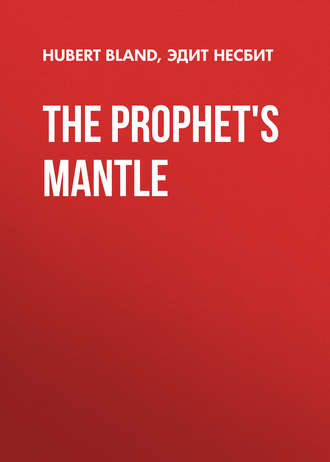
Эдит Несбит
The Prophet's Mantle
CHAPTER XXII.
A FORLORN HOPE
IF the frequenters of the Spotted Cow had only known, this was about the most unpropitious moment for obtaining a hearing for their petition. A hearing was all they could possibly obtain for it, but that they did not know either.
Litvinoff's host had not found him as great a comfort as he had expected. For one thing, the Count's almost universal sympathy seemed unaccountably to stop short at Roland Ferrier. The young man felt that he had been terribly ill-used and naturally expected every one else to see things in the same light, and it was 'riling' to find all the sympathy of his guest turned, not towards him, but towards his workmen, which did not seem reasonable; for, as Roland said, they could get other work, but where was he to get another mill? Then he did not like a certain change which he noticed in the other's tone when he spoke of Miss Stanley. He had sympathy enough for her, goodness knows—a trifle too much Roland sometimes thought.
For Litvinoff to be a bore was impossible; but still it did happen rather often that he would bring forward political economy of the most startling pattern when the other wanted to talk literature, or art, or personal grievances.
On this particular night Roland had been led, much against his will, into a discussion of the nature which Litvinoff so much affected, and he had to admit to himself that, as usual, he had much the worst of it.
'It's all very well,' he said (people always say, 'It's all very well,' when they can find no other answer to an argument); 'it's all very well, and that sort of thing may do for Russia, but you will never get an economic or any other revolution here— Why what the deuce is all that row?'
'That row' was a tramping of many feet on the gravel, and a hum of voices just outside the window.
Litvinoff, who was sitting nearer the window, rose and looked through the laths of the venetian blinds.
'Well, my dear Ferrier,' he said, turning round with a smile, 'it strikes me that there is a revolution in England, and that it has begun at Thornsett. The whole population of Derbyshire appears to have assembled in your front garden—yes, that's it, evidently,' he went on, as a ring was given to the door bell, 'and they are going to try gentle measures to begin with, just as I have always advised,' he concluded, for the ring was not a loud one.
Roland had risen from his easy-chair and had made towards the window, when the door opened and the maid announced that Clayton and one or two of the hands wanted to speak to Mr Ferrier.
'Show them in,' said Roland curtly; and, as she withdrew, 'One or two,' echoed Litvinoff; 'that young woman's ideas on the subject of numbers are limited and primitive. Now, Ferrier, just repeat those arguments you have been using against me, and I doubt not, so lucid and convincing are they, that they will reconcile Clayton and the "hands" here to the starvation that awaits them.'
Only three men followed old Clayton as he entered the room.
'Well, my men,' said Roland Ferrier, turning to them, and with a faint irritation in his tone, as Litvinoff, leaning one elbow on the mantelpiece, waved a recognition to the deputation, 'What can I do for you at this time of night?'
'Well, sir,' began Clayton, 'me and my mates here has come to speak to you for ourselves and them as is outside.'
'Who are numerous and noisy,' murmured the Count softly to himself.
'Well, go on,' said Roland, chafing.
'We knows well enow,' continued the old man, 'as it ain't all your doing as t' mill's to stop, but we thowt as you might work things so as to make it easier for us. It's on'y nat'ral as you shouldn't know till it's put to you what stoppin' work 'ill mean to most of us. What 'ill it mean? Why, hard want is what it 'ill mean, and clemming to more nor one. So wot we've come to ask is, won't you keep the works on till summer comes, and let the stoppin' be a bit less sudden like, and give us time to get other work? This is bitter weather, and it's bitter hard as we must all leave our homes just because—' He paused in some confusion.
'Because what?' asked Roland sharply.
'Because our masters has fell out,' struck in No. 2 of the deputation.
'Look here, my men,' Roland stamped his foot impatiently, 'I thought I made it perfectly clear to you a month ago that the closing of this mill was no fault of mine. Do you take me for a born fool? Do you suppose I should throw away this money if I could help it? Don't you know I lose as much as any of you? As much? I lose more than all of you put together.'
'Oh, just division of profits!' murmured Litvinoff confidentially to the clock on the mantelpiece.
'You've had long enough notice of this,' Roland went on, casting a goaded glance at Litvinoff; 'why didn't you get work elsewhere?'
'We hoped it 'ud blow over. We thought perhaps you'd make it up with Mr Richard; and we thought to-night as perhaps, if we told you straight out, you'd go to him.'
'Damn!' hissed Roland, between his teeth. 'I wish,' he went on, raising his voice, 'you wouldn't talk about things you don't understand. What's the use of coming up like this in the middle of the night, interfering in my private affairs; for I'd have you know my brother and I have a perfect right to close the mill or keep it open as we choose. As for you, Clayton, you're old enough to know better than to come up here at midnight with all the riff-raff of the village at your heels.'
'No more riff-raff than yourself!' this from the youngest deputy.
'Hold tha noise, Jim!' said old Clayton. 'The other lads has come up, sir, because they thought there mout be some good news, and they'd like to hear 'em as soon as mout be.'
'Well, they've had their tramp for nothing. That's all the news I've got for them, and much good may it do them.'
'Well, well, sir,' said Clayton, 'we didn't mean no harm. I'll tell 'em what you say. Good-night, sir!'
'Good-night, Clayton!' Roland spoke a little more gently. 'I'm sorry I can do nothing for you.'
The deputation turned to go. Litvinoff walked across the room and shook hands with each man as he passed out of the door.
'Good-night, my friends!' he said. 'Keep your tempers. This unfortunate business is no one's fault. It's the fault of the system we all live under.'
The door closed upon the last man. Roland turned angrily on his guest.
'I can't imagine,' he said, with asperity, 'how a man who is so sensible about most things can take the part of these unreasonable idiots!'
'My dear Ferrier,' relighting the cigar which had gone out in the excitement of the moment, 'of course I've the very greatest sympathy with you in this painful business, and I know how little it is your fault, but now, as always, I'm on the side of the workers, and you know I never disguise my views.'
'So it appears,' Roland was beginning, when the murmur of voices outside gave place to a single voice—that of one of the deputies, who seemed to be speaking to the men. Ferrier and his guest could hear the shuffling of many feet on the gravel as the men crowded round the speaker. When he stopped there was a tumult of hissing and yelling and groaning—a noise as of a very Pandemonium let loose.
Roland turned to Litvinoff.
'I hope you're proud of your precious protégés?' he said, and at the same moment a voice outside cried,—
'Let's smash the cursed walls in!'
Old Clayton's voice sounded thin and shrill above the uproar.
'Don't be fools, lads! Come away! Let un alone! Come home! We'll do no good here.'
The men seemed to hesitate a minute, and then to obey, reluctantly moving towards the gate.
'They have gone without doing anything very serious, you see,' said the Count; but even as he spoke a big stone, thrown by some strong hand, came crashing through the window, and rolled, muddy and grey, on to the edge of the soft fur hearthrug.
'Damn!' cried Roland furiously, 'I'll have the fellow who did that, anyway.'
He made a dash for the door, but Litvinoff caught him by the shoulders, and there was a struggle, silent and brief, which ended in Roland's standing still, and looking at the other savagely.
'Stay where you are, for God's sake!' shouted the Count; 'they've only done you five shillings' worth of damage now, but they'll perhaps add murder to it if you go outside. Do be reasonable, Ferrier. There, they've gone now; and if you went out you couldn't identify the man who did it.'
Roland turned away, and flung himself sulkily into a chair by the fire.
'I suppose you're right,' he said; 'but I shall be deuced glad to be out of the whole thing.'
It was perhaps as well for Roland's self-esteem and peace of mind that he did not hear the strictures that were passed upon him by the men as they returned towards the village. Hope deferred maketh the heart sick, but when a new-born hope is killed, and killed cruelly and suddenly, there comes sometimes something more terrible than heart-sickness and more dangerous.
The moon had flung aside the slight mist which had covered her face earlier in the evening, and now shone full on the valley, towards which the crowd were making their way. As they turned the corner which brought them in sight of the mill whose doors none of them were to pass again, a burst of curses and oaths broke from the men and fell on the still air, violating and outraging the peace and beauty of the night.
At this moment Hatfield and Murdoch, walking together from the village to meet them, came up and were promptly informed of the result of the interview.
'Ay, ay, lads!' said old Murdoch. 'What did Ah tell ye? as Ah thowt.' Then looking down at the mill he pointed towards it, and went on in a loud voice, 'Ye shall best have another try now. Go down and beg o' t' door-posts o' t' owd mill to take ye on again. Ye'll be as likely to get a good hearing fro' them as ye were fro' t' young puppy up yonder; and they'll not be laughing at ye as soon as yer turned, anyway.'
This last suggestion had the effect that Murdoch probably wished it to have. At once a dozen voices were raised for going back to Thornsett Edge, and not leaving a pane of glass in the window-sashes. The man who had thrown the stone before at once became a small hero, and met with numerous offers of assistance in going back and completing the work he had begun. Not a few of the men were excited by drink as well as by rage, having taken considerably more than was good for them before they started on the forlorn hope, and the excitement of these men communicated itself by those mysterious means which only manifest themselves on these occasions to the men who were sober. Roland Ferrier's words, passing from mouth to mouth, had been added to and altered so much that in the prevailing state of mind each man felt that he personally had been insulted and outraged by the man of whom he had asked the small favour of being allowed to continue to work until the winter-tide had passed. The idea of returning and wrecking the Ferriers' house became every moment more and more popular, and the crowd had actually faced round and begun that swaying movement which in an undisciplined body always, for a moment or two, precedes a start, when Hatfield spoke out at the top of his voice,—
'See here,' he said. 'In a few weeks now we shall all be gone to different parts, some on us to "the house." Most like, when that's done, when we're tramping the country far an' wide, and seeking the work we're turned out of here, they two'—pointing towards Thornsett Edge—''ll get tired o' goin' without their brass so long, maybe, an' 'ill make up the quarrel, and come back and start the mill again, with a new lot o' hands, to live i' our homes and eat the bread we're done out off.'
This new view of the case was received with a moment's silence by the hands; then a voice from the rear spoke out,—'Na, na, they 'ont, not if I can stop it; let's break t' ow'd mill to bits, and give the new hands the job to build it up again afore they work it.'
This suggestion, probably because its adoption was a trifle less dangerous than wrecking a house, some of whose inmates were young men—possibly young men with firearms—was received with almost unanimous applause. In less time than it takes to tell, a hundred pieces of the rock of which the Derbyshire walls are built had begun to rattle on the roof and smash the windows of the mill below, and two or three pairs of strong arms had torn away a huge boulder of grey stone which, held in its place by creepers and earth, overhung the descent, and had set it rolling down the steep decline. It bounded on to the slated roof of the mill, and with a great crash went right through it, leaving a large black gap. Then the men set up a yell that made the country round ring again. When it had died away old Murdoch, who was beside himself with excitement, shouted out, 'Why waste yer time i' chuckin' stones at the danged place, lads? Get down t' hill and burn it to the ground.' Another yell of approval greeted the proposition, and in a few seconds the hill-top was deserted, and the crowd, swayed by an irresistible impulse, was scrambling down the rocky decline and making for the mill.
The shout that had been sent up when the hole had been knocked in the roof had reached the quick ears of Count Litvinoff sitting smoking in silence opposite his host. He got out of his chair. 'I have a bit of a headache to-night,' he said, 'I don't think arguing agrees with me. I'll just go and take a turn across the moor.'
'All right,' said Roland. 'I won't turn in till you come back.'
Litvinoff sauntered out of the room and across the hall, took a stout oak stick from the hall-stand, and, opening the front-door, strolled leisurely down the carriage drive. But directly he was out in the road he pulled his hat down tightly upon his ears, vaulted a low stone wall and set off running in the direction of the mill as though a thousand devils were following at his heels.
CHAPTER XXIII.
FIRE!
TO run at full speed across a Derbyshire moor by the uncertain light of a wintry moon is a feat not unattended with difficulty and danger, especially when the runner is not quite accustomed to the course; but it would have taken greater pitfalls than even those moors present to have made Count Litvinoff choose a longer and easier way. For when that shout had been borne to him on the wind he scented excitement and danger, and excitement and danger were to him as the breath of life. He was almost certain that the men meant mischief, and he intended to do his best to prevent it. His sympathies really were, as he had told Roland, entirely with them, and he was genuinely anxious that they should not add a criminal prosecution for riot to their other troubles. At the same time he looked forward with some pleasure to the scene in which he was now hastening to take a part.
He had been in a fretful and irritable state of mind ever since he had left London, and he cordially welcomed a row, and did not care much if in that row he got a knock on the head that would put an end to his visit and his life at the same time. At any rate, the situation offered a chance of action, and it was action more than anything that he had been longing for lately.
As he got nearer the valley in which the mill lay he was able to form a better idea of what was toward, for the shouts seemed to get louder and louder. He quickened his pace at the moment when he reached the brow of the hill, from the foot of which all the noise and clamour arose, and paused, looking down; a lurid flash of flame lighted up for an instant the semi-darkness before him, and as suddenly died out again.
'Diable!' he said. 'I shall be too late for anything. I have some power over men, but I am not a fire-engine—'
He made the descent rather more cautiously, though not much less rapidly, than he had done the rest of the journey, and pushed his way through the little wood to within a hundred yards or so of the mill. Then he stopped, peering forward to ascertain the exact state of things before he went on.
The mill was not one of those square, many-windowed blocks which remind one of children's toy-houses, but a group of irregular buildings of all sorts and sizes, built of grey stone and roofed with slate. There was a paved yard surrounded by outhouses, some mere sheds of wood and thatch, and it was round the outhouse nearest to the mill itself that the men were crowding. There was plenty of light now for Litvinoff to discern every detail of the scene before him, for two sheds were on fire and burning merrily in the frosty air. The door of a certain room where he remembered to have seen quantities of cotton waste and inflammable rubbish, and which opened directly on to the yard, had been battered in by the men, and, the hinges having given way, hung crookedly by its strained, bent, but still strong, lock. Some of the men were hurrying to and fro between this room and the outbuilding, carrying armfuls of wood and straw, and these men were for the most part silent. The shouting, of which there was a good deal, was done by those who were doing nothing else.
Count Litvinoff had not been the only one to hear that first yell, and to interpret it as the note of something unusual, for dark heads were moving along the brow of the hill on the other side, and dark figures were hurrying down the stone steps.
The situation was obvious, and it was obvious too that no time was to be lost, for the crowd was becoming wilder and wilder, drunk with the strong wine of excitement as well as with the more habitual beer. Rioting, like everything else, grows by what it feeds on, and the higher the flames went the higher rose the cries that accompanied them. There is always something exciting about a fire—in the breaking loose of the tremendous force which we keep mostly as our servant. The fire was still small enough to be quenched if its originators so chose, but they saw well enough that soon it would be beyond their control, and would be their master in the place where it had been their slave. And they, too, had broken from their old place to-night. They were no longer the humble dependants of a rich man. Their hand was against him, and against all his class, and the new sense of independent, self-chosen action was intoxicating them all, and had driven far from them all thought of forbearance or of fear. For there was danger to the men themselves in this hell they were making. The out-buildings and the mill formed a square, and, once kindled, all would burn rapidly; and, from the slight eminence where he stood, the onlooker, cool and free from the madness that surged in the brain of the actors, could see plainly that the incendiaries ran a very fair chance of being caught in their own trap, and of perishing like rats in a barn. The big iron gates were closed immovably, and the only exit was by a narrow door. If once a panic began, and the men lost their heads in trying to pass this door, there might be a tragedy more terrible than Litvinoff cared to contemplate. He knew that if once the fire began in the mill itself there would be no chance of saving it, or anything else, and he could see that the men were beginning to drag burning fragments from the out-buildings, and he knew that they would be dragged to that room with the broken-in door. He paused no longer. That door was the point d'appui of the defence, and for that door he made.
He came rapidly down the hill and along the path that led to the little gate by which alone entrance to the yard could be effected. In the confusion of hurrying figures no one noticed the one figure more which, in a few strides, crossed the yard and planted itself just inside that broken door. Count Litvinoff glanced behind him and by the lurid glare of the burning timber opposite he could see the pile of straw and faggots in the room ready for the horrible bonfire. Just inside the lintel of the door something lay on the floor, gleaming redly in the firelight. He picked it up; it was a light, bright, long-handled steel hatchet.
'Aha,' he said; 'this is a gift from the gods!'
As he faced the yard, a great noise of mingled cheers and shouts went up from the crowd. It was not because they had seen their solitary opponent, but because the attack on what they thought the undefended mill was about to begin in earnest. All the active members of the riot were making for the door, headed by half-a-dozen stalwart fellows dragging blazing timbers.
'Stop!' shouted Litvinoff, in a voice that rang above the confused shouting of the crowd like a trumpet call.
And stop they did—and for quite twenty seconds held their tongues, to boot. Then arose a storm of indignation and derision when they saw that only one man stood in the way. They could not see who he was, and they cared little. The leaders made a forward movement, when—
'Stop!' he cried again, and his tones rose clear above the yells of the rioters, and were heard by timorous listeners on the hillside. 'Stop, and clear out of this as quick as you can get! Get to your homes, you fools!'
'Clear out yourself,' said a ringleader, 'or we'll clear you out!' But the forward movement had stopped. A parley had begun, and Litvinoff always felt that a chance of speaking meant for him a chance of winning.
'Put out that fire, and get back to your homes!' he cried. 'I've come down here to save you from penal servitude, and I mean to do it. Not a man of you gets inside this door!'
By this time all the crowd had come up, and formed a semicircle in front of him, about fifteen yards off. They could see his face better than he could see theirs, for the light of the flames behind them fell full upon him. He was deadly pale, but he looked deadly determined too. There was a dangerous gleam in his eyes, and a gleam still more dangerous from the bright blade of the axe which he had swung up on to his shoulder. Standing on the raised step of the door he looked tall and strong and bold.
Already the effect of this lion in the path made itself felt, for a faint cheer went up from the outside edge of the crowd, and a voice cried,—
'He's right. Let un be, lads—let un be, and go yer ways home.'
'All those of you who've got any sense left turn round and put out that fire. The work you've done to-night already is worth ten years in prison.'
'Then let's finish our work, lads, and earn our wages! Ten years' good feedin's better nor a month's clemmin',' shouted a burly young fellow of some six feet.
'Well said, Isaac Potts!' cried more than one. 'Dang his cheek! Heave him out of it!'
And some half-dozen rushed forward to suit the action to the word, foremost among them Isaac Potts. In the position Litvinoff had taken up, it was impossible for more than one man to attack him at a time. As the young mill hand, armed with a piece of wood still smouldering redly, sprang to lead the attack, a woman's voice—his sweetheart's—sounded shrilly from behind the crowd,—
'Keep back, Isaac—keep back; he'll brain thee for sure!'
The warning was unheeded, or, if the young man heard it, it only urged him on. He stopped an instant, hurled the wood at Litvinoff's head, and sprang forward to follow up his missile. The aim was not a good one. The brand only hit the door lintel, struck out a shower of sparks, and fell across the step. It was an unlucky miss for Isaac. Litvinoff planted one foot firmly, and gave his axe a swing. It came down crashing through collar-bone and shoulder blade, and almost severing the arm from the body. Isaac staggered back upon the men behind him, covering them with blood as he fell. There was a silence of a moment, which seemed long. The crowd drew a deep breath.
All the devil in Litvinoff's nature was roused now.
'Come on, you madmen!' he cried, as he recovered himself and brought his axe to the shoulder again. 'Come on! Get into this room now if you can!'
But the general ambition to get into that room was a little damped somehow, and the few who had been close on Isaac's heels fell back, and left him alone, all but one man, who stood glaring into Litvinoff's eyes. He held a heavy iron bar in his hand.
'Back you go, or down you go!' shouted Litvinoff, making a step towards him, and giving the axe a swing in the air.
The man did not wait for the blow. He retreated, and joined the crowd just as the girl who had shrieked that warning tore her way through to the place where her lover was lying, and bent over him.
Litvinoff brought his weapon to his side. Then he said quietly,—
'I told you none of you should get into this room, and none of you shall, by God! if I have to treat twenty of you to the same fare as this poor fellow. If you're sane men, pick him up and see to him, and perhaps nothing worse may come to you after all. Remember that every man who does not help to put that fire out breaks the law. For Heaven's sake be reasonable men. There are some here who know me. Do you think I care for this cursed mill? I came down here to save you. Help me to do it.'
The moderate party was a good deal stronger by this time; the axe had been a first-rate argument.
'Well done, sir!' 'Quite right, sir!' 'Hear, hear!' went up from the crowd, and two or three men came forward. Litvinoff resumed his defensive attitude, but they were not for attack. They busied themselves with their wounded friend.
'Is John Hatfield there?' called Litvinoff, seeing that he had prevailed. 'I want him. Hatfield, can't you manage to get a dozen of your friends to put out that fire? The best thing you can do is to knock down the sheds on each side, and then it will burn itself out and do no harm.'
'We will, sir,' Hatfield answered. 'You're right; this has been a mad night's work.'
All danger of further riot was at an end. The men who had been foremost in the work of destruction had made off as quickly as possible, and those who were left worked zealously under Hatfield's orders. The wounded man was carried off on a shutter to the nearest cottage. The fire was effectually put out with water from the reservoir. The men loafed off in twos and threes, and darkness and quiet settled down once more on Thornsett. Litvinoff and Hatfield remained till the last lingerer had left. Then Hatfield said,—
'Ah suppose this means the 'sizes for a goodish few o' us.'
'I hope not,' Litvinoff answered; 'I'll do my best for you—that is, I shall not know who was here to-night. But I advise you to clear out as early as you can to-morrow, and, if your friends who were in this business are wise, they'll do the same. Where have they taken that fellow I knocked over? I'd better go and see after him.'
They turned their back on the mill, and climbed the hill to the cottage, where the doctor who had been sent for was already busy with his patient.
'Is he going to live?' Litvinoff asked sharply.
'I think so,' was the answer; 'the greatest danger is loss of blood. He has been bleeding like a bull.'
'Oh, you must pull him through it, doctor,' said the Count. He slipped some gold into the hand of the woman who owned the cottage. 'Let him have everything the doctor orders, and you'll do all you can, I know. I'll be down to-morrow.'
He looked towards the girl who was crouching at the head of the bed as though he would have spoken to her, but seemed to think better of it, and rejoined Hatfield outside.
'I think he'll be all right,' he said, holding his hand out. 'Good-bye, Hatfield; don't forget what I said. Drop me a line to the Post Office, Charing Cross, London, to say where you are; and do let me beg of you, if it's only for your wife's sake, not to get mixed up in any more of this sort of thing. It must be on a much bigger scale before it'll be successful, my boy,' he ended, resuming his most frivolous manner, and turning away.
'I think I deserve a cigar,' he said to himself, as he started on the long return walk, by the road this time. And he lighted one accordingly.
About a quarter of a mile from Thornsett he met Roland Ferrier, who was walking quickly along, Gates by his side.
'Where have you come from?' the former asked abruptly. 'Here's Gates tells me the men are burning the mill, and I don't know what beside.'
'Oh, no, no,' the Count answered lightly; 'there's been a little orating and so forth, in which I have borne a distinguished part, but it's all over now. They wound up with a hymn or two, and went home to their wives. Come along back. I'll tell you all about it when we get in,' and, catching an arm of each, he wheeled them round and marched them back to Thornsett Edge.







